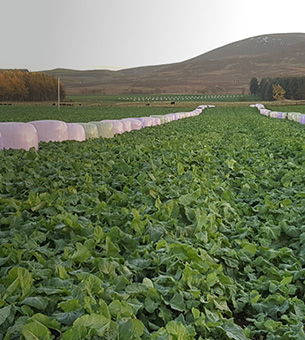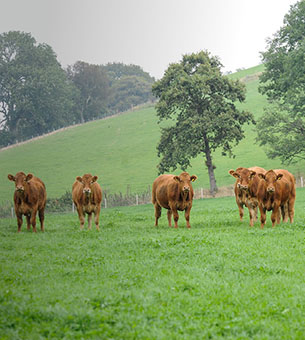As specialists in forage, Germinal is always looking to the future. Committed to research and development, we are driving innovation in seed production. We are not just part of the supply chain, but a plant breeder with vital knowledge in seed development.
Our research and innovation team, Germinal Horizon, comprises scientists at a world-leading grassland research centre, Aberystwyth University’s Institute of Biological, Environmental, and Rural Science (IBERS), and its own R&D farm sites.
In addition to their work within Germinal Horizon, our team oversees on-farm trials across the country to confirm new varieties work effectively in a real-life farming situation.
We talk to David Lloyd, Head of Forage Plant Breeding for Germinal Horizon in Aberystwyth, about the team’s industry-leading research spanning four decades.
High-ranking grass seed varieties
The overriding focus of Germinal Horizon is to meet the needs of livestock farmers across Britain and Ireland. Our breeding philosophy is to deliver forages farmers can rely on for optimal performance, balancing production traits such as yield and persistency with the highest possible quality.
Our grasses and clovers are precision bred to support modern production systems, maximising livestock performance and farm productivity. This guiding principle is reflected in Germinal varieties ranking highly on Recommended Lists and the Pasture Profit Index year after year.
Current and future challenges associated with climate change require responsibility and innovation in the grassland sector. Vast improvements can be made to the sustainability of grassland agriculture, both through management practices and by developing novel products.
Significant progress has been made in reducing nitrogenous emissions through the development of our Aber High Sugar Grass (HSG) range. Aber HSG varieties contain higher levels of water-soluble carbohydrates (commonly referred to as sugars), and therefore energy, than conventional ryegrasses.
Using this energy, rumen bacteria convert more of the plant protein into meat and milk. And with less protein wasted, ammonia and methane emissions are reduced.
Nitrogen fixation in legumes
Similarly, nitrogen fixation is a key driver of our forage legume programmes, allowing extensive reductions of applied mineral nitrogen fertiliser, a major source of greenhouse gas emissions.
We are breeding new types of red clover with the persistency of white clover under grazing but with protein protection in the rumen, reducing nitrogenous emissions and improving protein availability for the animal.
There is also a need to address increasingly frequent extremes of weather by developing new forage varieties to withstand, for example, longer dry periods. By introducing genetics from drought and heat-tolerant fescues, we are developing new deep-rooting ryegrasses designed for coping with future weather trends.
Similarly, we have been developing our DoubleRoot range of clover hybrids, mixing white and Caucasian clover genetics. These hybrids have greater tolerance to drought and cold conditions as well as improved tolerance of grazing.
The development process for these hybrids is one of decades and the first commercial varieties are now becoming available, underlining the forward vision required to breed plants for future scenarios.
Germinal’s well-established breeding population provides the ideal platform to continue developing the new agronomic and environmental traits most needed by grassland farmers now and in the future.



